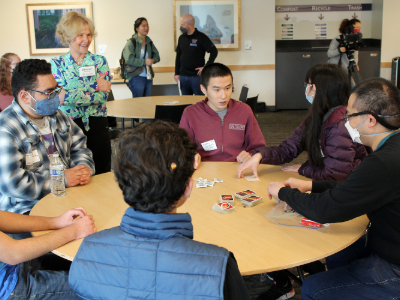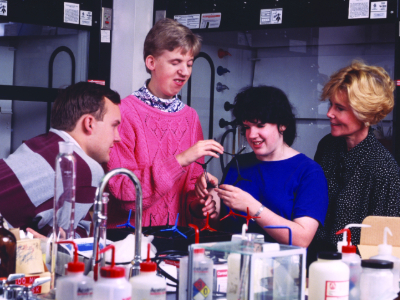Director's Digressions: Moving Forward

With mixed feelings, I share with you my plan to step down from my position as director of Accessible Technology Services and DO-IT as of December 31, 2023. My passion for universal design and accessibility for all led me to founding DO-IT in 1992, and I couldn’t have found a better home for my career. I leave DO-IT set up for success to continue creating a more accessible world into the future.
In 2024, I look forward to continuing to engage in projects of particular interest to me, doing more writing, spending time with our two grandchildren, and, of course, promoting universal design wherever my path may lead. I am going to miss all of the wonderful people I have worked with over the years, but I hope to stay connected with so many of you, including the participants in DO-IT programs continuing to lead the world into a more accessible future.
For those interested, here is a bit about my journey and the history of what has become ATS and DO-IT:
Although I had already graduated—twice—and worked as a teaching assistant at the University of Washington (UW), my first full-time job with the UW was with the Academic Computing Center (ACC). It was 1984. I came from a faculty-administrator position at St. Martin’s College (now University) in Lacey, Washington. My initial assignment was to build a Microcomputer Support Group to assist faculty, staff, and students who decided it was a good idea to replace their terminals (that connected to the mainframes) with a Macintosh or PC.
My group grew to become Desktop Computing Services. In 1992, during a budget-tight time, I was asked to “dabble” in grant writing, to seek funding to explore the feasibility of Internet use in K-12 schools, show how the use of technology can improve lives, and develop collaborations on campus, particularly with the department of computer science and engineering. My dabbling led to grant and state funding for DO-IT (Disabilities, Opportunities, Internetworking, and Technology). All DO-IT projects serve to increase the success of people with disabilities in college and careers, using technologies as empowering tool; many of them are in collaboration with faculty in the Paul G. Allen School of Computer Science.

DO-IT has grown substantially over the last 30+ years, becoming housed under Accessible Technology Services over time, when I helped push for more accessibility work to be done both on campus and off. Accessible Technology Services has two outreach units. DO-IT draws in partners on-campus, nationwide, and internationally, whereas the IT Accessibility Team reaches out to UW staff and faculty to join forces to ensure that all the technology the UW procures, develops, and uses is accessible to everyone, including faculty, students, staff, and visitors with disabilities. DO-IT has had a multitude of grant-led programs spanning the United States and even beyond, while, of course, always continuing our capstone program: DO-IT Scholars, which has helped lead hundreds of students with disabilities into successful degrees and careers.
Although I spend much of my time writing and giving presentations, what I will miss most about my job directing Accessible Technology Services and DO-IT is engaging with participants in the DO-IT Scholars, AccessComputing, and other projects. I plan to stay active in the field, so who knows where our paths may cross again.